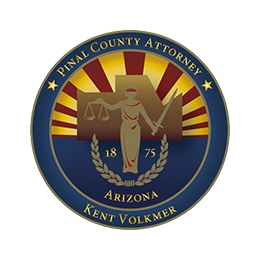Website Disclaimer
The information and materials provided using this web site are for informational purposes only and not for the purpose of providing legal advice. You should contact your attorney to obtain advice with respect to any particular issue or problem. Use of and access to this Web site or any of the e-mail links contained within the site do not create an attorney-client relationship between the Pinal County Attorney’s Office and the user or browser. The opinions expressed at or through this site are the opinions of the individual author and may not reflect the opinions of the Pinal County Board of Supervisors, County Manager or other elected officials.
The Pinal County Attorney’s Office strives to ensure that victims of crime are treated with fairness, respect, and dignity through its Victims Services programs. The Pinal County Attorney’s Office is staffed with victim advocates and legal assistants dedicated to ensuring victims’ rights are upheld and assisting victims of crime in navigating the criminal/juvenile justice system. Advocates provide victims with information on the many valuable resources offered by the community. Before charges are formally filed against a suspect, the victim will need to speak with the reporting law enforcement agency for updates on the incident. After charges are formally filed, a victim advocate is assigned to assist you with your case. In addition to serving victims of crime, advocates are available to provide domestic violence awareness training to the community.
The Pinal County Attorney’s Office has taken a very strong position on victims’ rights and is constantly seeking ways to improve the services we provide to crime victims. All victims of crime should be treated with fairness, respect, and dignity. As such, we have created a survey Victim Satisfaction Survey geared toward your experience with our Victim Advocates and Court Facility Dog team. Responses are utilized to improve processes, the services we provide, and to recognize those employees who perform above and beyond expectations. We also use this information for grant reporting purposes and responses can determine whether we will receive future funding. If you have any additional comments regarding the Victim Services Division, please provide those in the comments section at the bottom of the survey.


